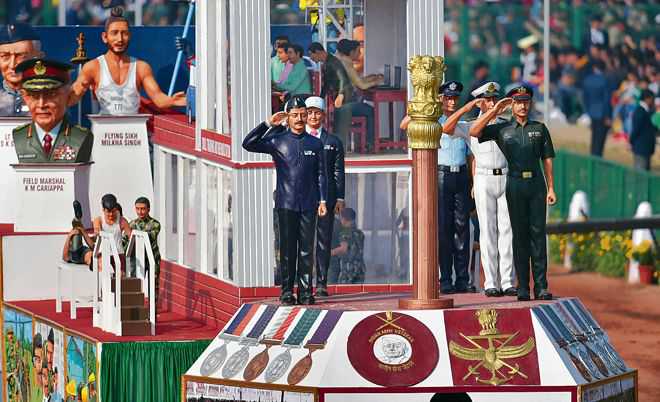This is perhaps the first General Election in which the armed forces have truly been sucked into the electoral rhetoric. It’s a new low for our democracy. The new government must recognise that it inherits the challenge of a fraying civil-military relationship, one that has destroyed many fledgling democracies. It is up to the polity to take the initiative to restore the balance.

Air Marshal Brijesh Jayal (retd)
Former Air Officer Commanding-in-Chief, South Western Air Command
RECENTLY, over 150 veterans, including eight former chiefs of the services, made an appeal to the President in his capacity as the Supreme Commander, expressing concern over the politicisation of the otherwise apolitical armed forces and seeking his intervention. Their apprehension was based on quoted instances of military operations and symbols being exploited during electioneering. Though no political dispensation was named, a reference to the ruling party was evident.
Not long after, one was privy to a news conference held at the headquarters of the principal opposition party where a retired Army Commander, under whose charge the ‘surgical strikes’ were executed in 2016, gave a briefing on the national security report that he had presented to the party president. The irony of the retired General professing to be apolitical in response to a reporter’s question, however, would not have been lost on those sensing a threat to our apolitical armed forces.
Whatever inferences one may draw from these instances, one thing is clear to an impartial observer. This is perhaps the first General Election in which the armed forces have truly been sucked into the electoral rhetoric. This is a new low for our democracy, especially when the reality of civil-military relations is that our polity sings praises of the armed forces when it suits them and takes them for granted when in the saddle. That we have been lax in introducing much-needed reforms in every facet of our national security landscape, in spite of many task force and committee recommendations, speaks volumes of our political intent.But electoral politics aside, this is perhaps a good opportunity for all those concerned about the important issue of civil-military relations in our democracy to look beyond party manifestos and promises to delve deeper into this complex field.
In Army and the Nation: The Military and Indian Democracy since Independence (2015), Prof Steven I Wilkinson, a political scientist at Yale University, draws on uniquely comprehensive data to explore the reasons why India, unlike other countries that inherited colonial ‘divide and rule’ armies, has been able to consolidate its democracy and make its army safe for democracy, unlike its neighbour Pakistan, which emerged from the same colonial Indian institutions.Reviewing the book in Foreign Affairs (September-October 2015), Andrew Nathan writes, “The protection of Indian democracy from military intervention looks on the surface like an unlikely achievement, given the weak institutions of civilian control that India inherited from the British Raj. Reaching back to the early years of Independence, however, Wilkinson shows that India’s new leaders took measures to prevent coups, such as institutionalising internal divisions within the army’s leadership, placing top officers under surveillance, assigning domestic intelligence to a civilian agency, and creating civilian-controlled paramilitary forces to handle internal security and counter-insurgency.”
Wilkinson’s research shows that Indian democracy and polity can claim credit for successfully steering civil-military relations to where India stands today. The question that recent happenings and debates pose is: what does the future hold and can we as a democracy remain sanguine?
According to Wilkinson, “the greatest challenge to civil-military relations is now not over the traditional concerns of higher command structures and ethnic hedging, but rather from the difficulties that the army faces in trying to remain a society apart. Party pressures, corruption and increasing political and societal efforts to interfere in its workings threaten its ability to retain its traditional recruiting structures and hierarchies and lead to strains on what has been up to now one of India’s major successes, the clear divide between the military and politics.”
These strains seem to be rearing their head, if recent events are any indicator. Looking at the external and internal security challenges facing the country that are becoming more demanding by the day and the political discourse that is getting more divisive, one shudders to look at the future with optimism. Clearly, one victim appears to be our civil-military relations and it is up to the polity to take the initiative to set right the balance before these ties begin to sour.
As India conducts another General Election, demonstrating to the international community its credentials as the largest democracy in the world, and as a new government chosen by the people takes charge, there is serious work to be done on the civil-military relationship front. The new government must recognise that it inherits the challenge of a fraying relationship, one that has, as Wilkinson’s work shows, destroyed many fledgling democracies. Equally, military commanders aspiring to choose politics as a career after their colour service must recognise that they owe it to this cause and the men and women they commanded to ensure a healthy cooling-off period, a self-imposed break of some years, before they jump into the rough and tumble of electoral politics.
